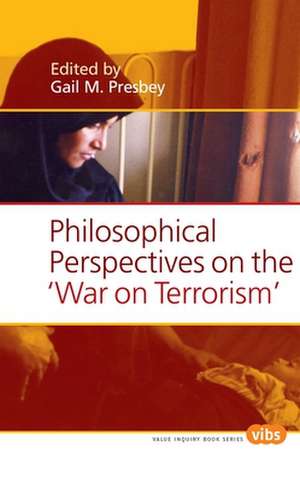Philosophical Perspectives on the "War on Terrorism": Value Inquiry Book Series / Philosophy of Peace, cartea 188
Gail M. Presbeyen Limba Engleză Hardback – 31 dec 2006
Preț: 748.21 lei
Preț vechi: 912.45 lei
-18% Nou
Puncte Express: 1122
Preț estimativ în valută:
143.19€ • 147.72$ • 121.19£
143.19€ • 147.72$ • 121.19£
Carte indisponibilă temporar
Doresc să fiu notificat când acest titlu va fi disponibil:
Se trimite...
Preluare comenzi: 021 569.72.76
Specificații
ISBN-13: 9789042021969
ISBN-10: 9042021969
Dimensiuni: 155 x 235 mm
Greutate: 1 kg
Editura: Brill
Colecția Brill
Seria Value Inquiry Book Series / Philosophy of Peace
ISBN-10: 9042021969
Dimensiuni: 155 x 235 mm
Greutate: 1 kg
Editura: Brill
Colecția Brill
Seria Value Inquiry Book Series / Philosophy of Peace
Cuprins
Foreword: G. Simon HARAK, S.J.
Preface: Gail M. PRESBEY
Introduction: Gail M. PRESBEY
Part One: Terrorism Analyzed
William C. GAY: The New Reign of Terror: The Politics of Defining Weapons of Mass Destruction and Terrorism
Jennifer L. EAGAN: Enforced Homogeneity or Mutual Difference? Luce Irigaray, the War on Terrorism, and International Peace
Dianna TAYLOR: Responsibility and/in Crisis
Part Two: Democracy as a Remedy for Terrorism
Mar PETER-RAOUL: Jihad or the Beloved Community? Benjamin R. Barber on Terrorism and Global Democracy
Richard PETERSON: Violence, Power, and Identity: What Are the Conditions of Terrorism?
Peter AMATO: Crisis, Terror, and Tyranny: On the Anti-Democratic Logic of Empire
Part Three: The United States’ “War on Terrorism”
William C. GAY: Bush’s National Security Strategy: A Critique of United States’ Neo-Imperialis
Harry van der LINDEN: Would the United States Doctrine of Preventive War Be Justified as a United Nations Doctrine?
Gail M. PRESBEY: Is the United States-led Occupation of Iraq Part of the “War on Terror”?
D. R. KOUKAL: The Mortal God to which We Owe Our Peace and Defense
Edward J. GRIPPE: Consequentialism, Negative Responsibility, and Sacrifice: Moral Dilemmas Posed by the Post-September 11th “Shootdown” Policy
Laura DUHAN KAPLAN: Jessica Lynch: Multiple Images, Multiple Realities
Part Four: Terrorism Case Studies
Oidinposha IMAMKHODJAEVA: Russia, Chechnya, and the Global War against Terrorism
Joseph C. KUNKEL: Ethics of Terrorism and the Case of Colombia
Rob GILDERT: Terrorism and Deterrent Violence: A Critique of Israel’s Justification of Military Violence
Oidinposha IMAMKHODJAEVA: The Role of Central Asia in the “War against Terrorism”
Harry ANASTASIOU and Robert GOULD: Securing Human Rights through War and Peace: From Paradox to Opportunity
Part Five: The Ethics of War
Richard PETERSON: Dilemmas of Intervention: Human Rights and Neo-Colonialism
John David GEIB: War and Peace in Christian Tradition: Why I Am an Engaged Christian Pacifist
Wendy C. HAMBLET: Emmanuel Levinas: From “Innocent Violences” to the Ethical “Just War”
About the Authors
Index
Preface: Gail M. PRESBEY
Introduction: Gail M. PRESBEY
Part One: Terrorism Analyzed
William C. GAY: The New Reign of Terror: The Politics of Defining Weapons of Mass Destruction and Terrorism
Jennifer L. EAGAN: Enforced Homogeneity or Mutual Difference? Luce Irigaray, the War on Terrorism, and International Peace
Dianna TAYLOR: Responsibility and/in Crisis
Part Two: Democracy as a Remedy for Terrorism
Mar PETER-RAOUL: Jihad or the Beloved Community? Benjamin R. Barber on Terrorism and Global Democracy
Richard PETERSON: Violence, Power, and Identity: What Are the Conditions of Terrorism?
Peter AMATO: Crisis, Terror, and Tyranny: On the Anti-Democratic Logic of Empire
Part Three: The United States’ “War on Terrorism”
William C. GAY: Bush’s National Security Strategy: A Critique of United States’ Neo-Imperialis
Harry van der LINDEN: Would the United States Doctrine of Preventive War Be Justified as a United Nations Doctrine?
Gail M. PRESBEY: Is the United States-led Occupation of Iraq Part of the “War on Terror”?
D. R. KOUKAL: The Mortal God to which We Owe Our Peace and Defense
Edward J. GRIPPE: Consequentialism, Negative Responsibility, and Sacrifice: Moral Dilemmas Posed by the Post-September 11th “Shootdown” Policy
Laura DUHAN KAPLAN: Jessica Lynch: Multiple Images, Multiple Realities
Part Four: Terrorism Case Studies
Oidinposha IMAMKHODJAEVA: Russia, Chechnya, and the Global War against Terrorism
Joseph C. KUNKEL: Ethics of Terrorism and the Case of Colombia
Rob GILDERT: Terrorism and Deterrent Violence: A Critique of Israel’s Justification of Military Violence
Oidinposha IMAMKHODJAEVA: The Role of Central Asia in the “War against Terrorism”
Harry ANASTASIOU and Robert GOULD: Securing Human Rights through War and Peace: From Paradox to Opportunity
Part Five: The Ethics of War
Richard PETERSON: Dilemmas of Intervention: Human Rights and Neo-Colonialism
John David GEIB: War and Peace in Christian Tradition: Why I Am an Engaged Christian Pacifist
Wendy C. HAMBLET: Emmanuel Levinas: From “Innocent Violences” to the Ethical “Just War”
About the Authors
Index
Recenzii
”the collection has much to offer. In addition, Presbey’s own contribution (one of the longer essays in the collection) provides a very useful overview--almost a timeline--of the policy decisions and justifications made during and after the buildup to the war in Iraq, the presumed “heart” of the “war on terrorism.” … [the book] takes up the task of restoring philosophical reflection as an integral part of public discourse traditionally valued by democratic societies. The essays in this book demonstrate that professional philosophy need not be merely an academic pursuit written for a specialized audience but can demonstrate and model the skills needed for responsible and engaged citizenship. This book helps restore the social and political role of philosophers. The essays here not only model how to ask the right questions, uncover unnoticed assumptions, and expose the contradictions between stated values and actual practices, but also point to alternative understandings of democracy, human rights, and intercultural dialogue. If the themes and ideas articulated in this book can help to shape a public (and not a merely academic) reflection on these issues, this book will accomplish more than being simply a welcome addition to philosophy of peace studies.” in: H-Net Reviews, March, 2009











